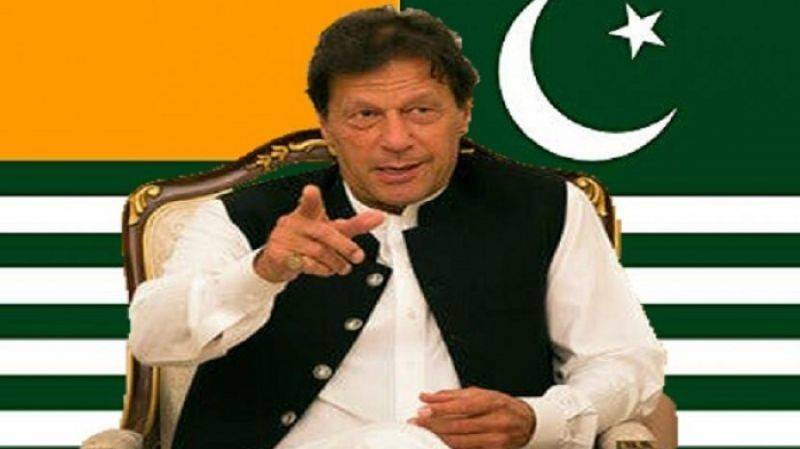Independent Kashmir? ––– Mind your words Mr Prime Minister!

Stay tuned with 24 News HD Android App

Believe it or not Prime Minister Imran Khan on Friday announced, quite shockingly, that Pakistan would be willing to give Kashmiris the right to independence even if they vote to stay with Pakistan as a result of the plebiscite to be held under the auspices of the United Nations as provided in the Security Council Resolutions.
Addressing a rally in Kotli (Azad Kashmir) to mark the Day of Solidarity with Kashmiri People in their struggle against the Indian occupation to liberate their motherland, the Prime Minister went on to say something that could never be expected from an elected Pakistani leader.
This assertion of Imran Khan reminded people of a similar wild idea offered to India by former President Gen Pervez Musharraf suggesting an ‘Out of Box Solution’ that was promptly rejected by the entire Kashmiri nation and leadership of all Parties Hurriyat Conference as well as all political parties of the country.
“When you decide on your future, and when the people of Kashmir, God willing, decide in Pakistan’s favour, I want to say that after that Pakistan will give Kashmiris the right that if you want to be independent or a part of Pakistan, this will be your right”, Imran Khan said at the Kotli rally.
The Prime Minister’s assertions were in complete contrast to the provision of Article 257 of the Constitution of Pakistan which reads: “When the people of the State of Jammu and Kashmir decide to accede to Pakistan, the relationship between Pakistan and that State shall be determined in accordance with the wishes of the people of that State”.

The general understanding about the fate of Kashmiri people is that they are more than willing rather committed to being part of Pakistan as was declared by the Father of the Nation, Quaid-e-Azam Mohammad Ali Jinnah that Kashmir is the jugular vein of Pakistan.
People in the occupied Valley carry Pakistani flags while protesting on the streets and bury their near and dears ones, who rendered their lives fighting against Indian troops, with their coffins wrapped up in Pakistani flags as well.
How could anyone then imagine that once they get freedom as a result of the UN-held plebiscite, they would be given the option to decide if they wish to be an independent State?
Initially, the reaction of the political leadership, intellectuals, former generals and media was very negative on the assertions of the Prime Minister.
India has, over a period of seven decades, been denying the right of self-determination to the people of the Valley despite the fact that the two South Asian neighbours had fought two wars on the future of the Kashmir.
The innocent and unarmed Kashmiri people have been struggling against the Indian occupation forces which have all along been killing people of the valley ruthlessly and unleashing the untold atrocities against Kashmiri women subjecting them to rapes.

It may be recalled that Pakistan’s military dictator, Gen Pervez Musharraf in April 2005 declaring that he had had a change of heart, ruled out any military solution to Kashmir conflict and instead projected an ‘out of box’ solution without any strict timeframe.
When an Indian journalist had asked Gen Musharraf during his visit to India as to what had led to his change of heart -- outside pressure, public opinion or his own realisation, he said it is a combination of all these factors adding that he thought the world has changed a great deal as the aftermaths of 9/11 tragedy.
The salient features of his out of box solution included: Firstly millions of troops, were stationed on both sides of the Line of Control (LoC) in Kashmir. Both India and Pakistan would have scaled back their troops in the region for lasting peace. Whether this would be gradual, phased withdrawal or not it would have to be worked out by the two sides.
Secondly, there would be no change of borders of Kashmir while people of Jammu & Kashmir would be allowed to move freely across the Line of Control (LoC). The LoC is effectively a ceasefire line, which both sides had accepted in the Shimla Agreement of 1972.
Thirdly, self-governance without independence. Pakistan had long been pleading of what it called ‘Kashmiri self-determination’ but Musharraf was willing to give that up in favour of a greater measure of autonomy.
And finally, a joint supervision mechanism in Jammu and Kashmir, involving India, Pakistan and Kashmiri representatives of all Parties Hurriyat Conference.
In 2019, the Indian Prime Minister Modi altered the constitutional status of Indian-administered Kashmir, removing the provision of the Indian Constitution’s Article 370-A that allowed the region its autonomy and absorbing it into the country’s administrative mainstream.
The move was rejected by Pakistan and the entire Kashmiri leadership; instead, they have demanded India Government reverse the decision as a precondition for any future talks to determine the fate of the struggling Kashmiri people.
India’s move was also met with anger within Kashmir at the grass-root level, where hundreds of thousands of military personnel clamped an unending curfew making the life of the common man miserable.
The Prime Minister must take extra caution to speak about sensitive national issues particularly the Kashmir conflict that has threatened the peace in South Asia for decades. Earlier, he wished Butcher of Gujrat, Modi to win the elections so that he could resolve the decades-old dispute between two nuclear neighbours. His assertions in Kotli rally has angered a large number of people not only in Pakistan but Kashmiris living across the globe.
